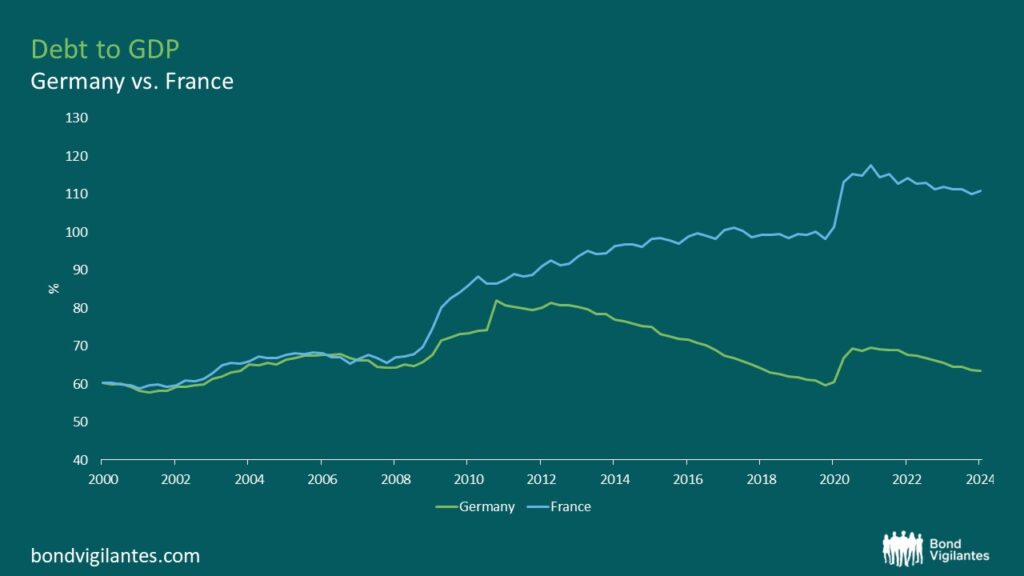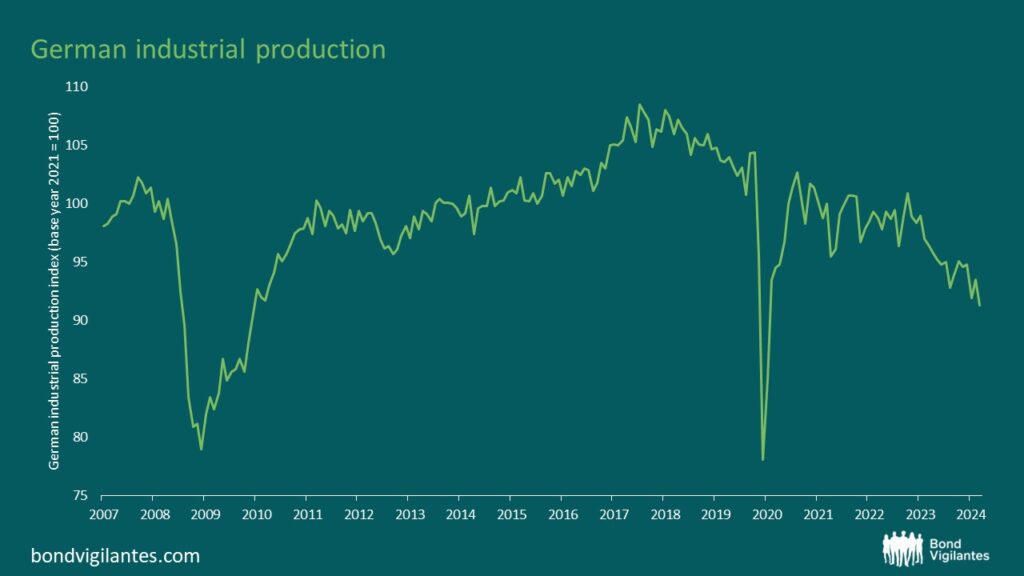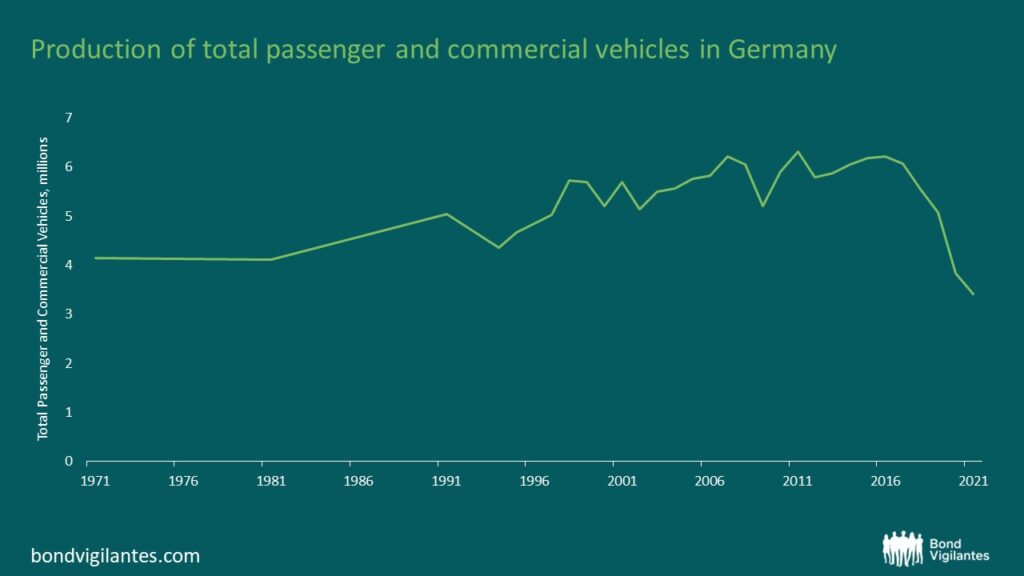Germany’s lagging economy: could fiscal restraint be a long-term strength amid global debt woes?
Germany, long known for its robust economic engine, is experiencing a slowdown. While several factors contribute to this economic stagnation, the country’s strict adherence to its fiscal policy has been a key driver, notably the “debt brake”. The debt brake, enshrined in the German constitution in 2009, limits the amount of new borrowing the government can undertake, keeping fiscal spending under tight control. While other countries have engaged in more aggressive fiscal spending, especially in response to crises such as the COVID-19 pandemic, Germany has chosen restraint, which becomes clear when making a simple country comparison.

At first glance, this fiscal conservatism has hindered growth, leading to questions about whether Germany’s tight fiscal policy harms its competitive edge. However, as other countries pile on debt, could Germany’s cautious approach eventually be seen as a strength?
Germany’s debt brake: a barrier to stimulus
The debt brake, introduced in 2009 after the global financial crisis, is a constitutional rule that limits the federal government to a structural budget deficit of 0.35% of Gross Domestic Product (GDP). This means that the government can only spend a certain percentage of its GDP in addition to the revenue it receives. Borrowing is only allowed in extraordinary circumstances for regional governments. This has been a defining feature of Germany’s fiscal policy for over a decade, allowing the country to keep its public finances in check even as many of its European neighbours have accumulated massive debt.
However, the strictness of the debt brake has also meant that Germany has had less room to manoeuvre in terms of fiscal stimulus, especially during economic downturns. Critics argue that Germany’s fiscal restraint has left it without the flexibility needed to jumpstart its economy in times of crisis – such as the pandemic, the war in Ukraine, and the energy crisis. This has contributed to lower levels of public investment in infrastructure, green technology, and innovation, which has weighed on the country’s growth prospects.
While Germany temporarily suspended the debt brake during the pandemic to inject stimulus into the economy, the policy was quickly reinstated, and the government is now focused on returning to budgetary discipline.
The immediate economic weakness
The German economy, which is heavily reliant on manufacturing and exports, has been lagging behind other advanced economies. One of the culprits behind this decline is the sharp increase in energy prices due to the war in Ukraine, a conflict that has disrupted global energy markets and led to a surge in natural gas prices. However, the issue of high energy prices is not merely a consequence of external events; it’s also a result of flawed government energy policies. While well-intentioned, Germany’s ambitious transition to renewable energy has led to significant challenges. The rapid phase-out of nuclear power and a reliance on intermittent renewable energy sources like wind and solar have left the country more dependent on fossil fuels, particularly natural gas, for stability in its energy grid. Additionally, weak global demand for goods, especially from China, one of Germany’s biggest trading partners, has further dampened industrial activity.
The knock-on effect is clear: less competitive pricing, reduced export demand, and a general structural weakening of the industrial sector.

The motor industry has contributed significantly to Germany’s structural decline in industrial production.

However, as dictated by the debt brake, Germany’s reduced fiscal spending also plays a significant role in its sluggish economic performance. In contrast to countries like the United States and the United Kingdom, which have engaged in aggressive fiscal expansion, Germany has kept its fiscal taps relatively tightly closed. This has led to weaker domestic demand, less public investment, and slower economic recovery. While inflation has been a concern globally, Germany’s limited fiscal spending has kept its inflation lower than in countries that pursued more aggressive fiscal policies.
The debt question: a long-term view
While the short-term effects of Germany’s fiscal restraint have been economic weakness and reduced growth, the longer-term benefits of this approach may become evident as other countries face mounting debt crises. The global debt load, especially in developed economies, has surged to unprecedented levels, with many countries now grappling with managing their massive deficits.
As interest rates rise in response to persistent inflation, the cost of servicing government debt is increasing rapidly. Countries with high debt-to-GDP ratios, such as the United States, Italy, France, and Japan, are facing growing pressure to balance their budgets while avoiding cuts to essential services or public investments. In contrast, Germany’s relatively low debt levels give it more fiscal stability, even as the global economy becomes more uncertain.
While other countries may eventually be forced into painful austerity measures to manage their debt burdens, Germany’s adherence to the debt brake could position it as a more financially stable country in the long run. If global interest rates remain elevated, heavily indebted countries will struggle to keep up with rising interest payments, leading to higher taxes, reduced public spending, and possibly financial instability. In this scenario, Germany’s conservative fiscal policy could be seen as a strength, providing a buffer against economic shocks. This dynamic began to unfold as interest rates increased. However, it would seem that, with central banks now moving interest rates lower, these highly indebted countries may have been given a temporary reprieve.
Could Germany’s restraint pay off?
With a manageable debt load and relatively lower borrowing costs, Germany may find itself in a position of strength as global economies deal with the fallout of excessive borrowing. This would allow the country to respond more effectively to future crises. While other countries may be constrained by their debt burdens, Germany could have more fiscal flexibility to introduce targeted stimulus or public investments without jeopardising its long-term financial stability.
Moreover, Germany’s lower debt levels could also make it more attractive to investors seeking safe-haven assets, especially if rising global debt levels lead to instability in bond markets. Germany’s prudent fiscal policy could make its government bonds more appealing to risk-averse investors in an era of high debt and rising interest rates.
The balance between growth and stability
Germany’s debt-relief policy has certainly come at a cost. The country’s lagging economy, weakened by reduced fiscal spending, is raising concerns about its long-term competitiveness, especially as other economies invest heavily in innovation and infrastructure. However, the question remains: will Germany’s fiscally disciplined approach ultimately prove to be the right path?
In the short term, Germany may continue to face economic headwinds due to its reluctance to increase public spending. However, as other countries confront the consequences of mounting debt in the long term, Germany’s fiscal restraint could position it as a model of financial prudence and stability. The challenge for Germany will be finding a way to strike the right balance between fiscal discipline and the need for growth-enhancing investments. The debt brake will likely be lifted, but under strict parameters; investment in infrastructure would be an obvious candidate. The real unknown is geopolitical risks; should these escalate, the brake will also likely be lifted, at least temporarily.
Conclusion
Germany’s weakening economy, driven partly by reduced fiscal spending due to the debt brake, has sparked debate about its approach to managing public finances. While the debt brake has constrained growth in the short term, it could be a long-term strength as other countries grapple with the rising costs of their debt.
As global debt levels reach new highs and interest rates continue to rise, Germany’s fiscal conservatism may ultimately provide a competitive advantage, offering more stability and flexibility in times of crisis. Whether this will be enough to offset the current economic weakness remains to be seen. Still, Germany’s bet on fiscal discipline could eventually pay off as the global economy confronts the challenges of high debt.
The value of investments will fluctuate, which will cause prices to fall as well as rise and you may not get back the original amount you invested. Past performance is not a guide to future performance.










